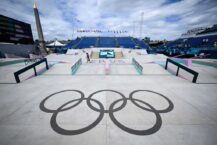No products in the cart.

College basketball players suit up after court ruling against NCAA transfer policy

One of two West Virginia players affected by the legal battle over the NCAA’s transfer rules played Saturday following this week’s court order blocking the organization’s restrictions against two-time transfers. West Virginia’s Noah Farrakhan scored 15 points in 18 minutes and fouled out near the end of his team’s 87-79 loss to Massachusetts in the Basketball Hall of Fame Classic.The other WVU player, RaQuan Battle, did not play. Coach Josh Eilert said Battle has been fighting an illness since testifying in the lawsuit against the NCAA on Wednesday. Eilert said he expects Battle will play next week. “To have those guys and have some depth at the guard position was going to be critical,” he said. “(Farrakhan) brought a lot of spark off the bench and he can handle the ball and really put a lot of pressure on the ball going downhill.” U.S. District Judge John Preston Bailey in West Virginia issued a temporary restraining order against the NCAA, allowing players such as Battle and Farrakhan to play. The ruling, part of a lawsuit by a coalition of seven states, said athletes who previously were denied the chance to play immediately after transferring a second time can compete in games for the time being.The lawsuit, which alleges the NCAA transfer rule’s waiver process violates federal antitrust law, could have a profound impact on college sports if successful. In court documents, the NCAA has said the plaintiffs “seek to remake collegiate athletics and replace it with a system of perpetual and unchecked free agency.”NCAA rules allow underclassmen to transfer once without having to sit out a year. But an additional transfer as an undergraduate generally requires the NCAA to grant a waiver allowing the athlete to compete immediately. Without it, the athlete would have to sit out for a year at the new school.Both Battle, who had his request for a waiver denied, and Farrakhan, who had not requested a waiver, are two-time transfers who have yet to earn a college degree. Battle, attended Washington and Montana State, and this would be his final year of eligibility. Farrakhan played at East Carolina and Eastern Michigan and still has two years of eligibility remaining. Farrakhan wasn’t the only player in his situation who opted to suit up. Cincinnati’s Jamille Reynolds, who previously played at UCF and Temple and had his waiver to play immediately for the Bearcats denied, came off the bench in a game against rival Dayton and guard Phillip Russell opted to play for UT Arlington against Air Force, And on the football field, Miami, Ohio, quarterback Maddox Kopp, who like Reynolds testified in a lawsuit earlier in the week by several states against the NCAA, made his season debut for the RedHawks in their bowl game against Appalachian State. Kopp hadn’t played this season when his waiver request was denied. He previously played at Houston and Colorado.
SPRINGFIELD, Mass. —
One of two West Virginia players affected by the legal battle over the NCAA’s transfer rules played Saturday following this week’s court order blocking the organization’s restrictions against two-time transfers.
Advertisement
West Virginia’s Noah Farrakhan scored 15 points in 18 minutes and fouled out near the end of his team’s 87-79 loss to Massachusetts in the Basketball Hall of Fame Classic.
The other WVU player, RaQuan Battle, did not play. Coach Josh Eilert said Battle has been fighting an illness since testifying in the lawsuit against the NCAA on Wednesday. Eilert said he expects Battle will play next week.
“To have those guys and have some depth at the guard position was going to be critical,” he said. “(Farrakhan) brought a lot of spark off the bench and he can handle the ball and really put a lot of pressure on the ball going downhill.”
U.S. District Judge John Preston Bailey in West Virginia issued a temporary restraining order against the NCAA, allowing players such as Battle and Farrakhan to play. The ruling, part of a lawsuit by a coalition of seven states, said athletes who previously were denied the chance to play immediately after transferring a second time can compete in games for the time being.
The lawsuit, which alleges the NCAA transfer rule’s waiver process violates federal antitrust law, could have a profound impact on college sports if successful. In court documents, the NCAA has said the plaintiffs “seek to remake collegiate athletics and replace it with a system of perpetual and unchecked free agency.”
NCAA rules allow underclassmen to transfer once without having to sit out a year. But an additional transfer as an undergraduate generally requires the NCAA to grant a waiver allowing the athlete to compete immediately. Without it, the athlete would have to sit out for a year at the new school.
Both Battle, who had his request for a waiver denied, and Farrakhan, who had not requested a waiver, are two-time transfers who have yet to earn a college degree. Battle, attended Washington and Montana State, and this would be his final year of eligibility. Farrakhan played at East Carolina and Eastern Michigan and still has two years of eligibility remaining.
Farrakhan wasn’t the only player in his situation who opted to suit up. Cincinnati’s Jamille Reynolds, who previously played at UCF and Temple and had his waiver to play immediately for the Bearcats denied, came off the bench in a game against rival Dayton and guard Phillip Russell opted to play for UT Arlington against Air Force,
And on the football field, Miami, Ohio, quarterback Maddox Kopp, who like Reynolds testified in a lawsuit earlier in the week by several states against the NCAA, made his season debut for the RedHawks in their bowl game against Appalachian State. Kopp hadn’t played this season when his waiver request was denied. He previously played at Houston and Colorado.




